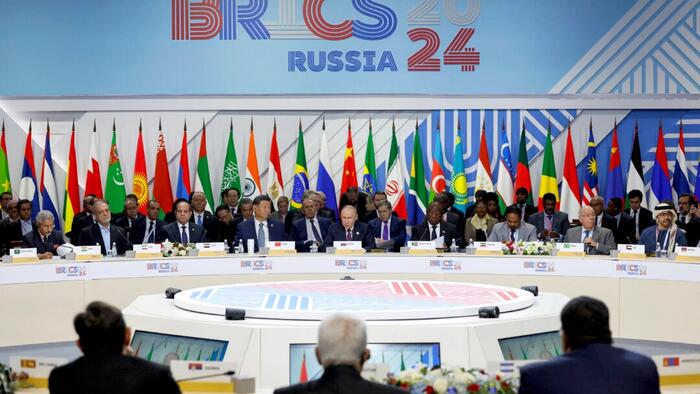The recent BRICS summit, held from October 22 to 24 in Kazan, Russia, gathered representatives from 36 nations, including 22 heads of state, to discuss the bloc’s ambitions, particularly in relation to “de-dollarization.” Led by Moscow and Beijing, BRICS aims to reduce reliance on the U.S. dollar as a global reserve currency. Russian President Vladimir Putin remarked on the necessity of searching for alternatives to the dollar, stating, “We do not reject… the dollar,” but pointed out the need for options due to perceived exclusion from the dollar-based financial system. This assertion came in the context of rising tensions and sanctions that many BRICS members face, notably Russia and Iran. Despite claims from BRICS leaders, many Western analysts view the prospect of successfully de-dollarizing the global economy as unlikely, given the dollar’s entrenched position.
Some experts argue that a viable alternative financial framework to the dollar is conceivable among BRICS nations, albeit a challenging endeavor. Ariel Cohen from the Atlantic Council believes that while creating a system to accommodate transactions in member currencies is theoretically possible, it would be a lengthy process. Former U.S. diplomat Matthew Bryza echoed this sentiment, stating that while some nations might eventually desire to move away from the dollar due to U.S. sanctions, the dollar’s financial utility remains compelling for most of the global economy in the present. Conversely, Mamdouh Salameh, an energy expert, contends that BRICS is seeking not to fully replace the dollar but to foster an independent financial system based on a shared currency, primarily to mitigate the adverse effects of dollar dependency on their economies and trade.
The founding of BRICS in the mid-2000s marked the beginning of its collective push against Western financial hegemony that was solidified after World War II under the Bretton Woods system, which linked the dollar to gold and established its dominance. Putin highlighted that a significant portion of trade between BRICS members, such as between Russia and China, is already conducted in their own currencies. Member nations regard de-dollarization as a strategy for economic protection against U.S.-led sanctions, which have historically targeted Russia, Iran, and other nations that oppose Western policies. This view was echoed by Iranian President Masoud Pezeshkian during the summit, where he criticized the United States for using the dollar as a means to exert control over other nations.
In response to the perceived threat of U.S. sanctions, BRICS nations are also contemplating the creation of alternative payment mechanisms that could operate independently of the SWIFT system, which has been criticized for being susceptible to U.S. influence. The latest joint declaration from the summit called for the development of more inclusive cross-border payment tools that minimize trade barriers. However, experts like Turkish analyst Ferit Temur caution that while initiatives like Russia’s “Mir” payment system have been launched, the complete independence from SWIFT poses significant challenges due to its widespread global usage. Bryza noted that any successful alternative would be contingent on a large enough coalition of countries willing to engage in a de-dollarized currency union, a scenario he views as improbable under current geopolitical circumstances.
Despite the apparent enthusiasm from BRICS leaders, many observers are skeptical about their ability to develop a robust and widely accepted payment system that rivals SWIFT. While some analysts perceive a trend toward de-dollarization as a potential avenue for countering U.S. economic policies, they also emphasize the enduring significance of the dollar as a dominant currency in global finance. Experts like Cohen and Wesley Alexander Hill emphasize that attempts by BRICS to diminish dollar supremacy are, at this moment, oversold and not supported by the current international financial infrastructure. They assert that both Russia and China understand the extraordinary challenges of creating a competing structure capable of effectively meeting global trading needs without involving the dollar.
Looking ahead, the ambition toward de-dollarization within BRICS seems to reflect both a reactionary stance against U.S. sanctions and a long-term aspiration for a reshaped global financial landscape. Discussions regarding the future of the dollar and the rise of alternative currencies highlight the growing dissatisfaction among emerging economies with their reliance on a dollar-centric system. Yet, as analysts point out, the path toward an alternative system may well take decades to come to fruition, suggesting that for the immediate future, the U.S. dollar will likely retain its primacy in international finance. The underlying economic realities, such as the sheer scale of the U.S. economy and its military backing, act as significant deterrents against dramatic changes in current financial dynamics.

